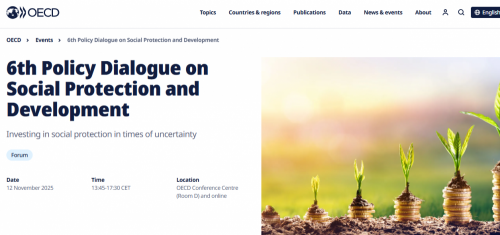
https://www.oecd.org/en/events/2025/10/6th-Policy-Dialogue-on-Social-Pro...
In 2024, only slightly more than half of the global population is covered by social protection, leaving nearly four billion people unprotected. With SDG 1.3 off track, the Fourth International Conference on Financing for Development (FfD4) urges developing countries to expand coverage by at least two percentage points annually. Achieving this goal requires scaling up domestic resource mobilisation and rethinking the role of development cooperation amid growing fiscal uncertainty.
The 6th Policy Dialogue on Social Protection and Development (PD-SPD) will examine how countries can reinforce the financial foundations of their social protection systems. Central to this effort is the mobilisation of regular domestic resources – such as progressive taxation and social security contributions – and effective engagement between social protection stakeholders and ministries of finance. The dialogue will also address the need for accurate, nationally tailored cost estimates to guide investment decisions.
At the same time, in a global context increasingly marked by worsening budgetary and fiscal situations both in traditional donor countries and in recipient ones, the dialogue will discuss how development cooperation can best support critical investments in social protection, particularly in low-income countries facing constrained fiscal space and debt distress. Participants will reflect on how international support can be better aligned with national priorities, and explore innovative approaches to financing inclusive and resilient social protection systems.
Interpretation in French and English will be available.
Co-organiser: Universal Social Protection 2030
Agenda
13:45-14:30 | Introduction: Investing in social protection in times of uncertainty
Social protection lies at the core of all Sustainable Development Goals (SDGs) and plays a vital role in eradicating poverty and reducing inequalities. However, accelerating the expansion of social protection coverage will require substantial resources. Taking place just months after the conclusion of the Fourth International Conference on Financing for Development (FfD4), the opening session will convene high-level policymakers and representatives of international organisations to present key outcomes from the conference and share concrete insights on the way forward.
Speakers:
· Ms. Ragnheiður Elín Árnadóttir, Director, OECD Development Centre
· Ms. Iffath Sharif, Global Director for Social Protection and Labor, World Bank
· Ms. Shahrashoub Razavi, Director, Social Protection Department, International Labour Organisation
14:30-15:45 | Session 1 – Filling the social protection financing gap through domestic resource mobilisation: Lessons learned from countries
Social protection systems demand consistent and sustainable long-term financial commitments. In this context, the mobilisation of regular domestic and local resources – such as progressive taxation and social security contributions – is essential. Drawing on country experiences, this session will examine how social protection policymakers can engage effectively with their counterparts in budget and finance ministries to build a compelling case for investment in social protection. The session will highlight national experiences associated with expanding social protection coverage, related costing and to allocate fiscal resources in line with policy priorities.
Moderator: Mr. David Brück, Permanent Representative of Ireland to the OECD and Chair of the OECD Development Centre Governing Board
Speakers:
· Mr. João Paulo Faria, Chief legal advisor and Head coordinator of the Fiscalization Network for the Single Registry and the Bolsa Família programme, Ministry of Social Development, Brazil
· Mr. Napoom Suwannapoom, Head of Actuarial Unit, Social Security Office, Thailand
Discussants:
· Ms. Gioia de Melo, Tax Economist, Country Tax Policy Unit, OECD Centre for Tax Policy and Administration
· Ms. Evelyn Astor, Director, Economic and Social Policy Department, International Trade Union Confederation (ITUC)
Other speakers to be confirmed.
15:45-16:00 | Break
16:00-17:15 | Session 2 – Rethinking the role of development cooperation to support the investment needs in social protection
In recent years, the aid landscape has undergone significant transformation, shaped by both long- and short-term drivers such as shifting priorities, tightening budgetary constraints, political changes, and the emergence of new actors. Ongoing uncertainty surrounding the medium- to long-term availability of multilateral and development aid financing – coupled with persistent criticisms regarding its effectiveness – has prompted a re-examination of the role of development cooperation. This session, convening representatives from both donor and recipient countries, will explore which aspects of social protection should be prioritised by development aid, the most effective modalities for its delivery, and how external support can contribute to strengthening national social protection systems, including their financing. Participants will reflect on the key factors that contribute to successful international cooperation in the field of social protection and consider innovative approaches that may enhance its impact in the future.
Moderator: Mr. Carsten Staur, Chair of the OECD Development Assistance Committee
Speakers:
· Ms. Paula Nolan, Development Specialist, Department of Foreign Affairs, Ireland
Other speakers to be confirmed.
Discussants:
· Mr. Helmut Schwarzer, Head of the Public Finance, Actuarial and Statistical Services Unit, International Labour Organization (ILO) or Mr. Umberto Cattaneo, Public Finance Specialist, Universal Social Protection Department, International Labour Organization (ILO)
Other discussants to be confirmed.
17:15-17:30 | Concluding remarks









